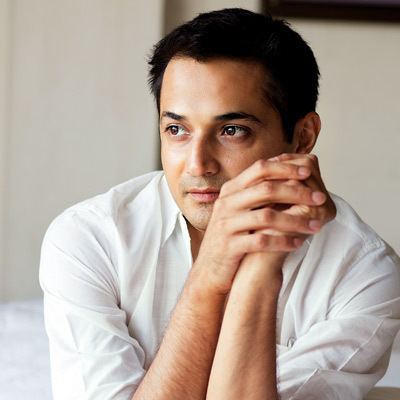‘It’s the phone call you dread – yet fully
expect.
‘Papa passed away,’ my sister said through
muffled sobs. ‘He died’ she repeated, as if I might not have understood her the
first time around.’
At first, this little book behaved as a ‘Kataar’, slashing through me, inch by inch and pain echoed in flashes. It became a warm sky eventually, where could I actually breathe.
In his book, Siddharth Shanghvi meditated over myriad of moments, vulnerable and intimate. Writing is crisp and elegant. The way author used metaphors is beyond any praises, “Considering death is like plunging your hand into pond: encountering shapes you cannot name…”
I have been amazed how author recollected the pieces of his broken soul and woven them into words with such precision. It takes certain amount of courage to write about your pain and longing.
“When we lose an intimate, two deaths occur. The
first is the formal, physical death of the person. The other death is of the
person we were around them.”
Basically, ‘Loss by Siddharth Shanghvi’ is consist of three essays, documentation of three deaths, along with few photographs.
“To write was to help someone else erase some part of their pain. This was the first motive for all my writing. It remains so.”
In first section, Siddharth Shanghvi reminisces about his father, Mr. Dhanvant, a fiery independent being, and to watching him to struggle with cancer and later, loneliness.
Author remembered the small ordinary moments with him, as how his father keeps aside all the good reviews of his books, he never forget to give company to his son to the dentist’s chair, and dropping him at school was his morning routine.
“In the end, the only thing we can do for anyone, beyond loving them, is simply to acknowledge them as they are, for who they are, even if it is to let them go from our lives.”
Here, author decoded many facets of life as, ritual of going temple, The Antyeshti sanskar, and urgent need of mourning space.
In second section, Siddharth Shanghvi talks about his dog, Bruschetta. ‘Maybe dogs know this trick, a sleight of paw as it were, they can hack into our loneliness, pry it open like a lock, decode its inner machinery, lay it bare, make us believe we were never teetering into the wrong side of alone.’ he writes.
The day Bruchetta comes into his life and the day he leaves, unforgettable imageries, lingers to your mind.
Siddharth analyzed the eternity of pain and marked some findings, “when will it all be done? But I cannot put myself down, I cannot euthanize the experience that deadens me.”
The essence of this essay is, “Grief is not a record of what has been lost but of who has been loved.”
Besides words, Author included some exquisite photographs
to this collection. In a photo, Ariel shot shows his father at the head of a
long lonely dining table. Another frame portrays the melancholy of empty house.
There was one shot of stairs which leads to nowhere, and a memory of his
four-legged angel peeking through the grill.
“Loss” embraced my soul from the beginning but the third section of the book about his mother, Padmini, just left an indelible impact on me.
It begins with pondering over a question of life, “Could someone else die for you, or could this idea be expanded to mean that you die when someone does?”
I am in awe of his words, and powerful imagery, author picked to describe his mother “In the blinking darkness of the ambulance I accounted all that was still intact, unchanged, prime among them my mother, unbreakable, indivisible, a sage of losses, a graduate from the university of untold suffering.”
Here, author tells about her mother’s disease, difficult hospital trips, moving bed, long nights full of suffering, Despite of having such mess around, she has strong personality, “Who laughed her heart out, and briefly it seemed her many miseries grew silent and her laughter was louder than her sorrow- louder than all life. “
She sings a lullaby for her son, writes handwritten letters to her husband and weaves a poetry book for her own soul, Here, I am sharing a piece of her poem ‘Bhatkan’.
जीयें तो कुछ ऐसे कि तन्हा न रहें हम,
जिनसे हैं, जिनके हैं, उन्हीं से जा मिलें हम।
And his mother’s advice “She told me to enjoy my fame but to never quite believe it. Write more. Read Read Read.
Word by word, this book dissects your very being and finds a hidden voice, longing for shore. Although, it is a short book, which hardly takes two days to finish, but this breathing tale will remain with you till eternity. Keep your loved ones close and this book even closer. Highly Recommended!
About the Author
Siddharth Dhanvant Shanghvi's
debut novel, The Last Song of Dusk, won the Betty Trask Award in the UK, the
Premio Grinzane Cavour in Italy, and was nominated for the IMPAC Prize.
Translated into 12 languages, The Last Song of Dusk was an international
bestseller. Shanghvi has been voted: India Today's 50 Most Powerful Young
Indians; Times of India's 10 Global Indians; Hindustan Times: 10 Most Creative
Men; Sunday Times UK: The Next Big Thing; New Statesmen UK: India's Ten Bright
Lights; Elle Magazine's 50 Most Stylish People. Shanghvi's new novel, The Lost
Flamingoes of Bombay, was nominated for the Man Asian Literary Prize 2008.
P.s. Can't Thank you enough Vivek Tejuja and HarpercollinsIndia for the copy.

